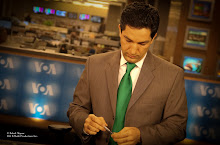May 04, 2012
Jailed activist cries out for
better conditions for Iran political prisoners
By Siamak Dehghan-Pour and
Bobak Gorji
Voice of America (Washington) -
An Iranian political prisoner called the global advocates of the human rights
to pay more attention to what he describes “a tough environment intentionally
created” by the authorities for ideological and political prisoners in Iran.
In a rare telephone
conversation from inside a prison in Iran, Alireza Sharifi-Boukani, told the
Voice of America’s Persian News Network, that tens of political prisoners are
living under a “miserable
condition” at the Rajaie-Shar prison in the city of Karaj west of the
capital Tehran.
“This is
the only way to echo our voices outside informing the world that 55 people are
living under the miserable conditions here in this section,” said the Kurdish
activist in an interview with the Persian
analytical talk show “Ofogh”, adding other members of Kurdish parties as well as the Mujahedin-e-Khalq (MEK) opposition, reformers and
also followers of the banned Bahai faith were among the prisoners.
According
to human rights groups, the Islamic state has dramatically escalated the
crackdown on dissents, arresting lawyers, students, journalists and targeting
media after the 2009 disputed presidential vote that secured the re-election of
the hardline President Mahmoud Ahmadinejad.
Sharifi-Boukani said “the
closed doors are the greatest psychological torture for the prisoners as the
gates are always locked and they have only a two-hour permission a day to go
out in an open area for breathing fresh air.”
“Some of the prisoners were
barred from medical treatments despite having serious diseases … we are even
deprived of having telephone contacts or personal meeting sessions with our beloved
ones,” he said without elaborating how he got the opportunity to speak on the
phone, but saying “not everyone here enjoys such an opportunity.”
The United Nations special
rapporteur of human rights in Iran, Ahmed Shaheed, who was attending the same Ofogh
show on April 19, said what Sharifi-Boukani has said was “quite typical
of a number of interviews” he had with some Iranians who had been jailed in
prisons.
Shaheed’s mandate was renewed
in March after his first year in the job he issued a report showing a rapid
increase of executions in Iran, with some 670 people put to death last year,
most of them for drug crimes that do not merit punishment under international
law and some for offenses against Islam.
The United States and the European Union have passed various sets
of sanctions on several Iranian firms, officials and individuals for being
involved in human rights abuses and in the
Islamic Republic’s controversial nuclear activities.
The executive director of the international campaign for Human Rights
in Iran, Hadi Ghaemi, in the same event warned the Iranian ruling power of
“trying to put any hurdle” ahead of the U.N. special rapporteur’s mission on
human rights situation in Iran.
Ghaemi said the most important problem is the “lack of independence
in Iran’s judicial system so that it has become a tool for intelligence
forces,” stressing the situation has been worsened particularly in the past
three years.
Tehran has banned Shaheed of traveling to Iran saying human rights were being used as a pretext to advance
the political interests of specific states and has repeatedly accused the West
of using what it says are bogus human rights concerns as a further way to
isolate the Islamic Republic.
“It is
said that the head of the prison has repeatedly said the instruction has come
from the top, from the state prosecutor general and also the intelligence
ministry, that these political prisoners should remain in the worst possible
conditions,” said Sharifi-Boukani, who was arrested
in 2010 and was sentenced
for a 42-month jail term on charges of acting
against the country’s security.
Shaheed, confirming Sharifi-Boukani’s comments on the worse
conditions for political prisoners at Rajaie-Shar than the other types of
prisoners, said “I aware of that there is a different treatment in prisons for,
what may be called as political prisoners who face the worst treatment in terms
of rights violation.”
He further expressed concerns over “deficits in human rights
standards” in treatment of prisoners in Iran and said “There is a need to
demand Iran that rule of law be enforced, the laws that statured in their book
themselves being prevented strictly.”
“I would like to use this opportunity to invite people who have
information on conditions there (in Rajai-Shahr prison) to talk to me and give
information on that, so when I have sufficient material, I can form that as
part of my report,” said the U.N. human rights investigator.
Sharifi-Boukani, in another contact later with Ofogh said he and
his cellmates were happy about spreading their voices by the Voice of America
throughout the world despite the high risks of being threatened and pressurized
by the authorities.






هیچ نظری موجود نیست:
ارسال یک نظر